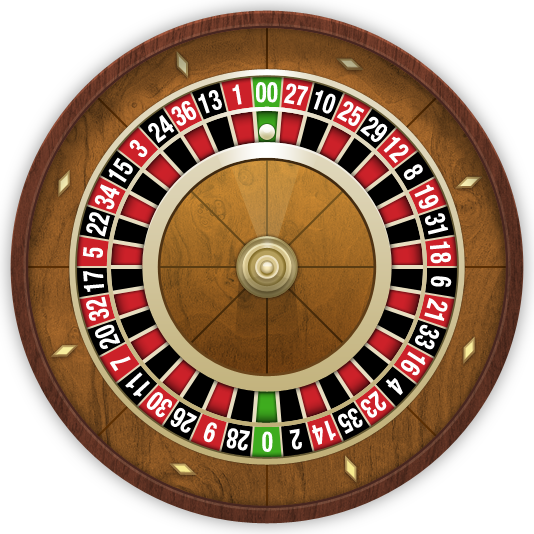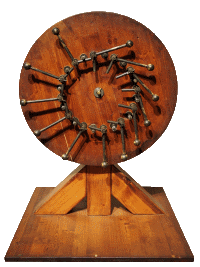Pascal Roulette
Who Invented Roulette?

Blaise Pascal. Back in 1655, the French inventor, physicist, and mathematician named was working on a perpetual motion machine. If you forgot your Science-to-English dictionary, it's basically a machine that would continue to run without having to draw any outside energy. If you've studied physics, you know that's not possible. ButPascalwas pretty tenacious and curious. He didn't succeed at building a perpetual motion machine, but he succeeded at inventing one of the greatest casino games of all time.
According to several pieces of literature, roulette was played in Paris in 1796. Early roulette wheels had both a single zero and a double zero. But in 1843, two Frenchmen created a single zero roulette wheel to help casinos attract business (a lower house edge is always great for business).
It is widely accepted that the roulette wheel was invented by a French inventor and mathematician called Blaise Pascal, who was not actually trying to invent a game but rather a perpetual motion machine back in 1655. Mar 29, 2019 Pascal was a French mathematician, physicist, inventor, and writer who is credited with inventing the first roulette wheel. It was during Pascal’s younger years that he started to manufacture roulette, which in turn, led him to introduce the mathematical theory of probability.
Dec 08, 2020 The Roulette Wheel was invented by Blaise Pascal in the early 17th century. Blaise Pascal was a French Physicist, mathematician, and inventor who has made various discoveries and inventions notably Abacus. Pascal was a French mathematician, physicist, inventor, and writer who is credited with inventing the first roulette wheel. It was during Pascal’s younger years that he started to manufacture roulette, which in turn, led him to introduce the mathematical theory of probability.
Roulette Arrives in America
By the late 1700s, New Orleans becomes the gambling capital in the US. And thanks to French immigrants, roulette quickly became one of the most popular games in Louisiana. Early roulette tables in the US were a bit different than what you see today. Instead of 38 numbers including 1 through 36, 0, and 00, the roulette wheel has 28 numbers, two zeros, and a symbol of an American Eagle. The last symbol gave the house an extra edge. How big? A ridiculous 12.9%. Casino players weren't thrilled, so the American Eagle was quickly nixed.
But because US casinos wanted the extra edge, they opted for two zeros on the roulette wheel instead of the standard single zero used at European roulette casinos. The extra zero gives the house a bigger advantage, which is why many casino players prefer theEuro version to the American one.
Roulette History: The Age Of Online
In 1996, the first online casino hit the Internet. The available games were limited to a handful of slot machines and a couple of blackjack tables. It took a few years for roulette to follow, but once people discovered how thrilling betting on red could be from the comforts on home, playing roulette would never be the same.
No longer would players be forced to play just one type of roulette. The top Internet casinos offer the American, French, and European varieties, so you can literally feel like you're playing in a casino in any part of the world that appeals to you.
We've come a long way from a physicist trying to invent a perpetual motion machine. Today, roulette players can place bets from iPhones, iPads, Mac, PCs, or pretty much any other device they own.
But there are a lot of roulette players who still crave the type of human interaction that you just can't get from ordinary online casinos. That's why many Internet gambling sites have evolved to include live dealers. Instead of computer-generated graphics for the wheel, a live dealer spins an actual wheel via a webcam. This isn't some live dealer in a dark warehouse. The top online roulette sites use real dealers based in actual casinos. It's the closest thing to being in a real casino.
Play Roulette Today
Looking for a great place to play online roulette? We've reviewed a number of sites and narrowed down our list to the best. Have a look at our reviews and discover the one that offers the perfect experience for you.
Popular Pages

Mathematician, physicist, religious philosopher and wordsmith: By any standard, Blaise Pascal exemplified the term Renaissance man.
Born on June 19, 1623, in Clermont-Ferrand, France, Pascal established himself in his early teens as a self-taught mathematical prodigy [source: Britannica; 'Prodigy']. At the tender age of 16, he dreamed up Pascal's theorem. According to the theorem, if you draw any hexagon inside any conic section (the curve that occurs when a plane intersects a cone) and then extend the lines of opposite sides, they will meet in three points lying on the same line.
Advertisement
Advertisement
Switching gears, Pascal built one of the first digital calculators in 1642 to aid his father, a mathematician and tax collector, humbly dubbing it the pascaline. The pascaline used gears and pins to perform integer addition. Through a few simple mathematical tricks, a person could also use it to subtract, multiply and divide. Different versions could handle five-, six- and eight-digit numbers. The real trick, though, lay in tackling the nondecimal French monetary denominations, in which 20 sols equaled a livre and 12 deniers made a sol.
As a spinoff of his work on perpetual motion, which he explored in his efforts to improve the pascaline, Pascal also invented the core technology of the roulette machine [source: MIT].
Grade-schoolers still learn Pascal's triangle, a three-sided arrangement of integers such that every number equals the sum of two diagonal numbers above it, as the accompanying illustration demonstrates. Pascal didn't invent the configuration (Chinese and Persian mathematicians used it more than 500 years earlier). However, he found novel uses for it, including calculating probabilities.
In 1654, Pascal, now a worldly 31, brought his knack for formalization and analysis to bear once again as he worked with Pierre de Fermat to establish the calculus of probabilities. While corresponding to solve a gambling puzzle, the two men hit upon the idea of equally probable outcomes, a fundamental concept that had eluded other analysts. A coin flip landing heads or tails, or a single die roll coming up any number from 1-6, are examples of equally probable outcomes. Pascal codified their findings into a general rule for calculating probability, using his handy triangle to simplify the calculations [source: Fermat and Pascal].
Like any Renaissance man worth his salt, Pascal's talents weren't limited to one subject area. Up next, we'll see how his contributions to physics, metaphysics and letters also would reverberate for years to come.
Advertisement

As Pascal grew older, he began delving increasingly into the physical sciences and Christian philosophy.
Around 1646, he began a series of atmospheric pressure experiments to test the theories of Galileo and Galileo's student Evangelista Torricelli (the Italian physicist who identified the principle governing barometers). Cobbling together his own mercury barometers, Pascal undertook expanded versions of his predecessors' experiments, producing findings that helped lay the foundations for hydrodynamics and hydrostatics [source: Britannica; 'Blaise Pascal']. Eventually, he even got a unit of pressure measurement named after him, the Pascal.
Advertisement
Advertisement
Pascal's pressure experiments also inspired him to invent the syringe and the hydraulic press. The latter derived from an observation that we now know as Pascal's Law: External pressure exerted on a confined liquid propagates undiminished through the liquid in all directions no matter where the pressure is applied.
Hydraulic presses use this principle to create mechanical advantage: When a small amount of force pushes a small piston a long distance into an incompressible fluid (like water, oil or hydraulic fluid), a larger and heavier piston on the other end of the fluid system will move upward a short distance. Think of it as liquid leverage. Just as a lever allows you to lift a heavier weight than you normally could, the force multiplication described by Pascal's Law explains how hydraulic lifts elevate cars and how hydraulic brakes apply enough force to stop a several-hundred-ton airplane.
Brilliant as his technical inventions and physical research were, Pascal gained perhaps more fame for his far-reaching contributions to philosophy and Christian thought. His best-known philosophical invention was Pascal's Wager, the argument that pragmatism demands living your life as if God exists, because you will lose little if God is a myth but stand to gain immeasurably (eternal life) if God is real [source: Honderich; 'Pascal's Wager'].
Now a religious philosopher and Christian apologist, Pascal argued for the Christian faith and for God's existence using psychology and history, instead of relying on more typical metaphysical analysis [source: Honderich; 'Blaise Pascal']. He set out much of his argument in his unfinished work of Christian apologetics, Apologie de la religion chrétienne, which scholars later collected with other notes in a work known as Pensées (Thoughts) [source: Britannica; 'Blaise Pascal'].
Pascal's inventiveness extended to literature as well. His work Provincales -- an attack on Jesuits in defense of Antoine Arnauld, a defender of Jansenism on trial at the time -- remains popular to this day. Nicolas Boileau, the founder of French literary criticism, considered Pascal's writings to mark the beginning of modern French prose [source: Britannica; 'Blaise Pascal'].
Pascal Roulette
Like Archimedes or Galileo, Pascal was a true polymath, the product of a disciplined, curious and analytical mind.

Advertisement
Blaise Pascal Roulette Machine
Related Articles
Sources
Blaise Pascal Roulette Machine
- American Heritage Science Dictionary. 'Pascal's Law.' 2005. Houghton Mifflin Company.http://www.thefreedictionary.com/Pascal%27s+law
- Encyclopedia Britannica Online. 'Blaise Pascal.' (March 19, 2011)http://www.britannica.com/EBchecked/topic/445406/Blaise-Pascal
- Encyclopedia Britannica Online. 'Prodigy.' 2011. (March 19, 2011)http://www.britannica.com/EBchecked/topic/477899/prodigy
- Fermat, Pierre de and Blaise Pascal. 'Fermat and Pascal on Probability.' (March 21, 2011)http://www.york.ac.uk/depts/maths/histstat/pascal.pdf
- Hazewinkel, Michiel. 'Pascal's Theorem.' Encyclopedia of Mathematics. 2002.
- Hazewinkel, Michiel. 'Pascal's Triangle.' Encyclopedia of Mathematics. 2002.
- Honderich, Ted. 'Pascal's Wager.' The Oxford Guide to Philosophy. 2005.
- Honderich, Ted. 'Blaise Pascal.' The Oxford Guide to Philosophy. 2005.
- Massachusetts Institute of Technology School of Engineering. 'Mechanical Calculator.' May 2003. (March 20, 2011)http://web.mit.edu/invent/iow/pascal.html